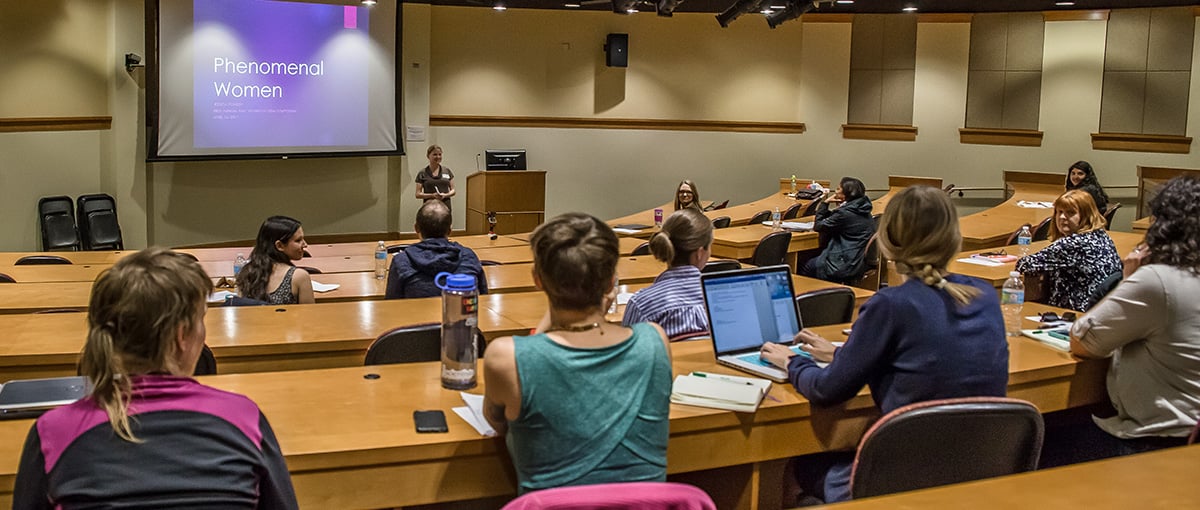 Attendees at Women in STEM forum
Attendees at Women in STEM forum
The gender disparity in STEM-related careers has traditionally been staggering, with far more men going into science, technology, engineering and mathematics than women.
The Women in STEM club at CU Anschutz is determined to change this.
Building Confidence
In an effort to cultivate confidence among scientists, men and women alike, Women in Stem at CU Anschutz held its first annual Spring Symposium on April 24. Women from campus spoke about their scientific experiences and created an open environment for personal discussion.
“We decided to make the theme of our first event 'Empowerment and Inspiration,' because a lot of women in STEM feel disempowered,” said Abigail Armstrong, president of Women in Stem at CU Anschutz. “We wanted to light a fire under them to persevere despite the challenges they face.”
Vice Chancellor for Diversity and Inclusion Brenda J. Allen, PhD, delivered the keynote address. By encouraging participants to seek personal empowerment, this talk established the uplifting tone for the rest of the symposium.
After Allen, Kate Smith, an assistant professor in the CU School of Medicine, spoke about her journey to becoming a tenure-track professor while overcoming her self-doubts. Vanessa Carmean, an alumna of the CU Anschutz Medical Campus, talked about strengthening her voice and the voices of her female colleagues. “Though difficult, these experiences have taught me that I can take power over my own life,” Carmean said.
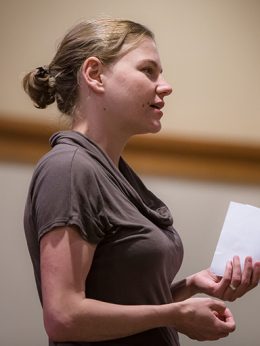 Jessica Ponder
Jessica Ponder
Following Carmean, four short, jargon-free talks by CU Anschutz female faculty and students highlighted a variety of difficult aspects of STEM that scientists struggle with. Although each speaker chose a different topic, all the segments held a positive underlying message of self-empowerment.
“Many scientists get buried in jargon during their talks,” said Armstrong. “We thought this would be an innovative and exciting way for scientists to talk about their passion to a broader audience.”
Jessica Ponder
“How many of you consider yourselves phenomenal?” asked Jessica Ponder, a PhD student at CU School of Medicine. A few bashful attendees raised their hands. “Well, I have 10 minutes to change that. Let’s get started,” announced Ponder, speaking to those women who had not raised their hands.
Her words of encouragement resonated through the auditorium. She highlighted her leadership in community involvement, and expressed her confidence in the capabilities of the women in attendance to lead projects. “Bring your voice and passions to the foreground,” said Ponder. “You, too, are phenomenal.”
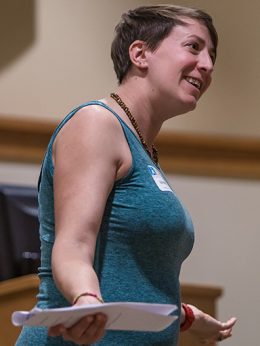 Liz McCullagh
Liz McCullagh
Liz McCullagh
Liz McCullagh, also a postdoctoral fellow in the CU School of Medicine, raised awareness of barriers encountered by young women interested in science, including some that are self-imposed. She asked everyone in the room to write down words to describe the ideal woman STEM candidate and the ideal male STEM candidate. To the surprise of everyone in the room, the words used to describe the men were about their achievements. The words used to describe the women were more about their social characteristics like “enthusiastic,” “fearless” and “confident.”
McCullagh emphasized the importance of mentor figures and advocated for self-confidence. “Let’s show girls they can become strong, STEM women,” said McCullagh. “Let’s be realistic. There are struggles, but we did it.”
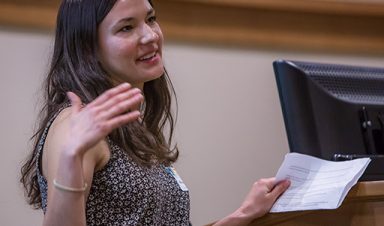 Allison Porman
Allison Porman
Allison Porman
Allison Porman, a postdoctoral fellow in the CU School of Medicine, spoke about her unusual journey through various STEM careers. When she expressed her personal frustrations with science—which included competition among scientists for grants and authorship of research papers—sentiments of agreement echoed around the room. However, positive undertones remained. “You may feel disheartened, but science can help those around you,” said Porman in a closing statement. “We can improve the whole world.”
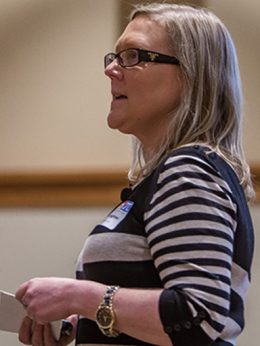 Christina Coughlan
Christina Coughlan
Christina Coughlan
Christina Coughlan, a CU Anschutz senior faculty research instructor, gave the final talk. In Ireland, where she grew up, pursuing a STEM career was not only abnormal, but discouraged. She gives credit for her success to the strong women who mentored her through her journey. Coughlan closed with a warm sentiment advocating for mentorship among women on campus and in the community.
The seminar closed with a discussion in which attendees shared tactics to improve self-confidence and empowerment. “Advocate for yourself,” said McCullagh. “Build a strong support network. Find mentors and mentor back. Let’s gain some power back.”




